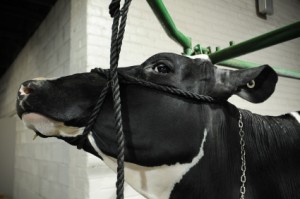Trigger Warning: Discussions of rape.
Dear colleagues,
Many of you may have seen a meme that is floating around called, “Sexual Violation.” It reads:
Sexual violation of female animal bodies for exploitation, murder and profit.
Animal Agriculture’s shameful standard industry practices.
It is time for the masses to reject these crimes. LIVE VEGAN.
The image is not reproduced here because it is extremely triggering. Several species of animals are shown in a variety of compromised positions, as men sexually violate and rape them, the point being that standard animal agricultural practices are similar to the rape of women. In other words, Nonhuman Animal pornography is being used to promote veganism.
In the caption, the author writes, “I know this is difficult to see. I take no joy in sharing it.” No joy in sharing it? Well there’s something behind the rationale of those who have been sharing it…
The entire point of pornography is to titillate via the sexual degradation and humiliation of an oppressed body. Those who consume pornography are consuming it specifically to “get off,” so to speak, on the demonstrated powerlessness of otherized bodies. The relationship between the viewer and the viewee is one that reproduces and reinforces a hierarchy of domination. Pornography users also report experiencing a “tolerance,” meaning increasingly degrading and shocking imagery is needed for them to feel something. The pornography industry is happy to serve that need by producing increasingly disturbing media.
So what makes it any different for vegan advocates who share these images with the intention of shocking people with images of violated and degraded animal bodies? And for that matter, what gives them the right? What’s stopping them from using images of men raping women to solicit shock value? Should we also recount graphic tales of other women’s rape to rally for veganism?
I argue that sensationalizing the rape of other animals feeds rape culture and revictimizes women. While the public may not be aware of the institutionalized rape of Nonhuman Animals, most of us are aware of the epidemic of rape against human women. Most of us know this from first-hand experience.
Knowing that about 1 in 3 women have or will be raped, I find it extremely inappropriate to utilize rape imagery to promote veganism. First off, our primary audience is women. If 80% of the movement is women, and 1 in 3 women are rape victims, that means that more than 27% of our movement (or more than 1 in 4 activists) are likely to have been the victim of rape. Any rape victim can tell you, seeing images of rape or reading graphic descriptions is extremely triggering. It is also revictimizing when it is made obvious that our community doesn’t care enough about our safety to avoid using our experiences for animal rights claims on our behalf.
These types of tactics demonstrate tokenizing. That is, they appropriate the experiences of an oppressed group for the movement’s purposes, while the movement fails to address the ongoing and continuing oppression that group is still experiencing. What’s worse, the movement itself is responsible for aggravating that oppression. For example, PETA’s slavery and Holocaust analogies use the horrific experiences of oppressed people of color and Jews for their purposes, but, in doing so, they fail to acknowledge that these memories are not forgotten, but are still hurting. In addition to that blatant insensitivity, PETA is presuming that racism, slavery, and human genocide are things of the past, when they are actually ongoing injustices. Furthermore, PETA fails to acknowledge the present-day needs of communities of color, often excluding them. In other words, PETA uses the experiences of the oppressed when it is convenient for them to do so, but they simultaneously haven’t done anything to alleviate those injustices and actually aggravate them.
Likewise, the Nonhuman Animal rights movement is a very misogynistic space. Not only does PETA and other groups like Animal Liberation Victoria, LUSH Cosmetics, and Citizens United For Animals regularly aggravate sexism through their tactics (see our Organization Watch for more examples), but activist spaces themselves are rife with male-on-female violence (See Emily Gaarder’s 2011 release Women and the Animal Rights Movement). If the movement isn’t going to take violence against women seriously, it has no business using our oppression for its gain.
Recall the author wrote, “I know this is difficult to see.” The author knew exactly what they were doing. They wanted to trigger. Those who utilize memes and arguments that liken Nonhuman Animal rape to women’s rape seem to forget that many people exposed to those arguments are rape victims themselves. Triggering these memories and trivializing these experiences does nothing to dismantle oppression. Indeed, they only facilitate it. It becomes one more means of alienating women from anti-speciesist work. It becomes one more means of solidifying male rule over advocacy spaces. It works to keep women in a constant state of not-belonging, of victimhood, of hurt.
Recognizing the intersections between human and nonhuman oppression is important, but we have to practice sensitivity in doing so. Blasting activist spaces with violent pornography is one example of how not to practice sensitivity.
 Dr. Wrenn is Lecturer of Sociology. She received her Ph.D. in Sociology with Colorado State University in 2016. She received her M.S. in Sociology in 2008 and her B.A. in Political Science in 2005, both from Virginia Tech. She was awarded Exemplary Diversity Scholar, 2016 by the University of Michigan’s National Center for Institutional Diversity. She served as council member with the American Sociological Association’s Animals & Society section (2013-2016) and was elected Chair in 2018. She serves as Book Review Editor to Society & Animals and has contributed to the Human-Animal Studies Images and Cinema blogs for the Animals and Society Institute. She has been published in several peer-reviewed academic journals including the Journal of Gender Studies, Feminist Media Studies, Disability & Society, Food, Culture & Society, and Society & Animals. In July 2013, she founded the Vegan Feminist Network, an academic-activist project engaging intersectional social justice praxis. She is the author of A Rational Approach to Animal Rights: Extensions in Abolitionist Theory (Palgrave MacMillan 2016).
Dr. Wrenn is Lecturer of Sociology. She received her Ph.D. in Sociology with Colorado State University in 2016. She received her M.S. in Sociology in 2008 and her B.A. in Political Science in 2005, both from Virginia Tech. She was awarded Exemplary Diversity Scholar, 2016 by the University of Michigan’s National Center for Institutional Diversity. She served as council member with the American Sociological Association’s Animals & Society section (2013-2016) and was elected Chair in 2018. She serves as Book Review Editor to Society & Animals and has contributed to the Human-Animal Studies Images and Cinema blogs for the Animals and Society Institute. She has been published in several peer-reviewed academic journals including the Journal of Gender Studies, Feminist Media Studies, Disability & Society, Food, Culture & Society, and Society & Animals. In July 2013, she founded the Vegan Feminist Network, an academic-activist project engaging intersectional social justice praxis. She is the author of A Rational Approach to Animal Rights: Extensions in Abolitionist Theory (Palgrave MacMillan 2016).
Receive research updates straight to your inbox by subscribing to my newsletter.



